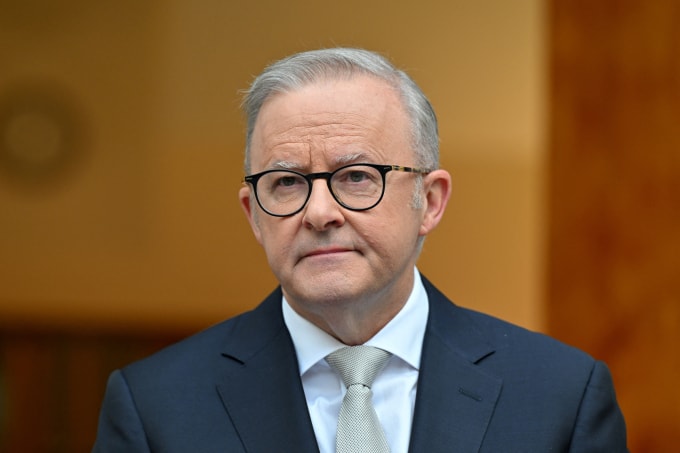Some countries have objected to Mr Trump's reciprocal tariffs, calling them 'completely absurd' and 'not based on any logic'.

US President Donald Trump announced on April 2 that he would impose a 10% tax on all imports and higher tariffs on some major trading partners. Accordingly, the UK, Brazil, and Singapore will be subject to a 10% tax. The European Union, Malaysia, Japan, South Korea, and India will be subject to 20-26%. China and Vietnam are among the countries subject to the highest tariffs, at 34% and 46%, respectively.
Prime Minister of Australia Anthony Albanese said the US decision was "completely absurd" but would not respond. "President Trump mentioned reciprocal tariffs. If there was reciprocity, the correct tariff rate should be 0%, not 10%," he said.
The US and Australia have a free trade agreement. The US has a 2:1 trade surplus with Australia. "This tax policy is not based on any logic and goes against the spirit of cooperation between our two countries. This is not the action of a friend," Prime Minister Anthony added.
Mr Trump claimed the US bought $3 billion worth of Australian beef last year, but Australia does not import US beef. Mr Albanese explained that the ban on fresh US beef was due to strict biosecurity requirements.
New Zealandalso rejected Mr. Trump’s argument about the 20% tariff that the country applied to American goods. Commerce Minister Todd McClay said the tariff schedule proposed by the White House did not reflect reality, and asked New Zealand officials to clarify the issue.
"We don't have a 20% tariff," said a New Zealand official, who said the country's tax system was very low and that the exact figure would be below the 10% rate the US imposes on all countries. "We're not going to retaliate because that would raise prices and increase inflation," he said.
Chilean President Gabriel Boric warned that the tariffs were not only destabilizing but also challenging “agreed principles” of international trade. Chile was hit with a basic reciprocal tariff of 10%. The US is now the country’s second-largest trading partner, after China.
GovernmentOlder brotherinsisting the US remains its “closest ally”. Business Secretary Jonathan Reynolds said the country hoped to reach a trade deal that would “minimise the impact” of the 10% reciprocal tariffs.
However, Mr Reynolds noted that "nothing is off the table, and the government will do everything necessary to protect the UK's national interests." British officials also insisted that there would be no immediate retaliation. The Confederation of British Industry (CBI), one of the country's largest business associations, supported the move.
In Europe, Prime MinisterItalyGiorgia Meloni called the new 20% tariff imposed on the EU a "wrong" decision, saying it did not benefit anyone.
“We will do everything we can to reach an agreement with the United States, to avoid a trade war that would weaken the West and give an advantage to other global competitors,” Meloni said, adding that the government would act in the interests of the country and its economy and discuss the issue with European partners.
European Central Bank (ECB) President Christine Lagarde said Europe needs to act now and accelerate economic reforms to be able to compete in what she called an "inverted" world.
“Everyone benefited from America’s hegemony as a nation committed to a multilateral, rules-based order,” she said, referring to the post-Cold War era of low inflation and open global trade. “But today we face closure, fragmentation and uncertainty.”
Mexico and Canada have been temporarily exempted from reciprocal tariffs, as long as their goods meet the terms of their free trade agreement with the U.S. However, the previously announced 25 percent tariff on imported cars will remain in effect.
PresidentMexicoClaudia Sheinbaum said she would wait to see how the reciprocal tariffs affect Mexico before taking action. "It's not like we're going to respond immediately to tariffs," Sheinbaum said at a press conference.
CanadaThe EU has already imposed retaliatory tariffs on US goods worth 26 billion euros ($28 billion), including bourbon, prompting Trump to threaten a 200 percent tariff on European wines.
In listing the countries targeted by the tariffs, President Trump repeatedly stressed that he did not blame them for imposing tariffs and non-tariff barriers to protect domestic businesses. “But we do the same thing right now,” he said.
Experts say neither side would benefit from a full-blown trade war. “Trump is once again putting Europe in a dilemma,” said Matteo Villa, a senior fellow at the Italian Institute for International Policy Studies.
“If Trump does impose high tariffs, Europe will have to retaliate, but paradoxically the EU may be better off doing nothing,” he said. If they retaliate, Washington will be under more pressure but Europe will suffer more because it depends more on exports to the US.
VN (according to VnExpress)